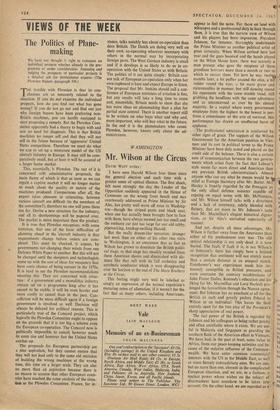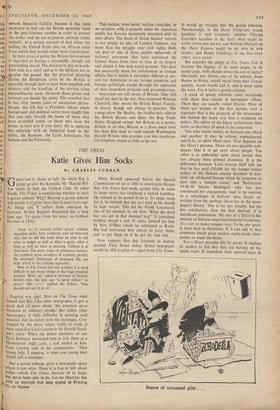WASHINGTON
Mr. Wilson at the Circus
DAVID WATT writes :
I have seen Harold Wilson four times since the general election and each time with a greater sense of optical illusion. The first shock, felt most strongly the day the Leader of the Opposition suddenly appeared in the House of Commons on the wrong front bench and was courteously addressed as Prime Minister by Sir Alec, has pretty well worn off even in Washing- ton—though the striped pants and black coat, when one has actually been brought face to face with them, have always seemed just too small and the embassy car just too large for our old tubby, pipesucking, ketchup-swilling Harold.
But the really dream-like sensation, stronger last week than on either of his other two visits to Washington, is an awareness that as fast as Wilson has grown to dominate the British politi- cal stage, so that stage has steadily receded from these American shores and diminished with dis- tance like that raft with its full orchestra and acrobatic conductor which is seen disappearing over the horizon at the end of The Marx Brothers at the Circus.
This feeling might very well be labelled as simply an expression of the normal expatriate's maturing sense of alienation, if it weren't for the fact that so many others, including Americans
appear to feel the same. For those on land with telescopes and a professional duty to look through I them, it is true that the narrow view of Wilson and his players has been impressive. President Johnson, for instance, thoroughly understands the Prime Minister as another political artist of great virtuosity. When Wilson arrived here last year and the guns boomed and the bands played on the White House lawn, there was scarcely a man present who gave the recipient of these grandiose honours more than a month or two in which to savour them. Yet here he was. twel months later, a bit puffier around the chin, a bt redder round the eyes. a hit more grave and statesmanlike in manner, but still dancing round his opponents with the same nimble tread, still grabbing the headlines with the same adroitness and as unconcerned as ever by his absurd majority. In a capital where every government employee fro:5m the highest to the lowest is per- force a connoisseur of the arts of survival, this performance has drawn an unaffected burst of applause.
The professional admiration is reinforced by other signs of grace. The support of the Wilson Government for the American position in Viet- nam and its cost in political terms to the Prime Minister have been duly noted and placed on the credit side of the balance. There is also a certain ease of communication between the two govern- ments which arises from the fact that Labour's style seems far more direct and American than any previous British administration's. Almost anyone who can say what he means would be fat relief as Foreign Secretary after Mr. Butler. Mr.
Healey is frankly regarded by the Pentagon as the only allied defence minister capable of arguing on equal terms with Mr. McNamara, and Mr. Wilson himself talks with a directness and a lack of ceremony, subtly blended with flattery, that are more to Mr. Johnson's taste than Mr. Macmillan's elegant historical digres- sions, or Sir Alec's unstudied superiority of manner.
And yet, despite all these advantages, Mr. Wilson is further away from the Americans than either of his predecessors ever was. The old special relationship is not only dead. it is now buried. The fault, if fault it is, is not Wilson's or Johnson's; there has simply been a belated recognition that sentiment will not stretch more than a certain distance in an unequal match. Eisenhower's war experiences made him im- mensely susceptible to British pressures, and even overcame the contrary machinations of John Foster Dulles. Kennedy's education and his liking for Mr. Macmillan and Lord Harlech pro- longed the favouritism through the Nassau agree- ment. But Johnson has no penchant at all for the British as such and greatly prefers Erhard to Wilson as an individual. This leaves the field entirely open for the free play of the President's sharp appreciation of real power.
The real power of the British is regarded by Johnson and his colleagues as being rather patchy and often unreliable where it exists. We are use- ful in Malaysia and Singapore as guarding the southern flank of the American effort in Vietnam. We have had, in the past at least, some value in Africa, from our peace-keeping activities and be- cause of the sedative influence of the Common. wealth. We have some common commercial interests with the US in the Middle East, as well as some fiercely contradictory ones. We are one, but no more than one, element in the complicated European situation, and we are, in a fashion, a nuclear power whose wishes on the subject of disarmament have somehow to be taken into t account. On the other hand. we are regarded as a ' I
• %,
serious financial -liability because it has been in the past fourteen months in order to protect the dollar, and we are at present, perhaps rather unjustly, in a certain amount of bad odour for pulling the United States into an African crisis from which they would rather have stayed aloof.
In these areas of policy the Wilson Government is regarded as having a reasonable, though not outstanding record. The decision to stay in South- East Asia is a relief and so is the decision not to
value the pound. But the practical planning 'during the Rhodesian crisis by the British is generally thought here to have been muddled and dilatory and the handling of the sterling crises extraordinarily inept. However these pluses and minuses are, beside the point. The essential fact is that after twenty years of unrequited philan- thropy, the US has a President whose whole background and political career have taught him that you only scratch the backs of those who have scratched yours, or those who have the power to hurt you if you don't. He is applying this principle with an impartial hand to the
Allies, the Russians, the Latin Americans, the
n Indians and the Pakistanis.
This sudden, even harsh, realism coincides, by no accident, with a moment when the American public has become immensely absorbed with its own affairs. The flood of 'Great Society' reform is not simply an idea of Lyndon Johnson, any more than the struggle over civil rights.. Both are part of one of those sudden upheavals of national awareness that have convulsed the United States from time to time in its history and shaken it into new social patterns. This does not necessarily make for isolationism in foreign affairs, but it makes it extremely difficult at pre- sent for Americans to see foreign countries and foreign politicians except through the spectacles of their immediate purposes and preoccupations.
Americans are still aware of Britain. They still recall her part in the war, they mourned Winston Churchill, they revere the British Royal Family, in theory though not always in practice. The young adore the Beatles, the intellectuals admire the British theatre and films, the Rag Trade thinks 'England swings' but Britain as a power, Britain as an idea, Britain as a place mean even less than they used to--and outside Washington Harold Wilson, who presides over this insubstan- tial kingdom, means as little as the rest.































 Previous page
Previous page